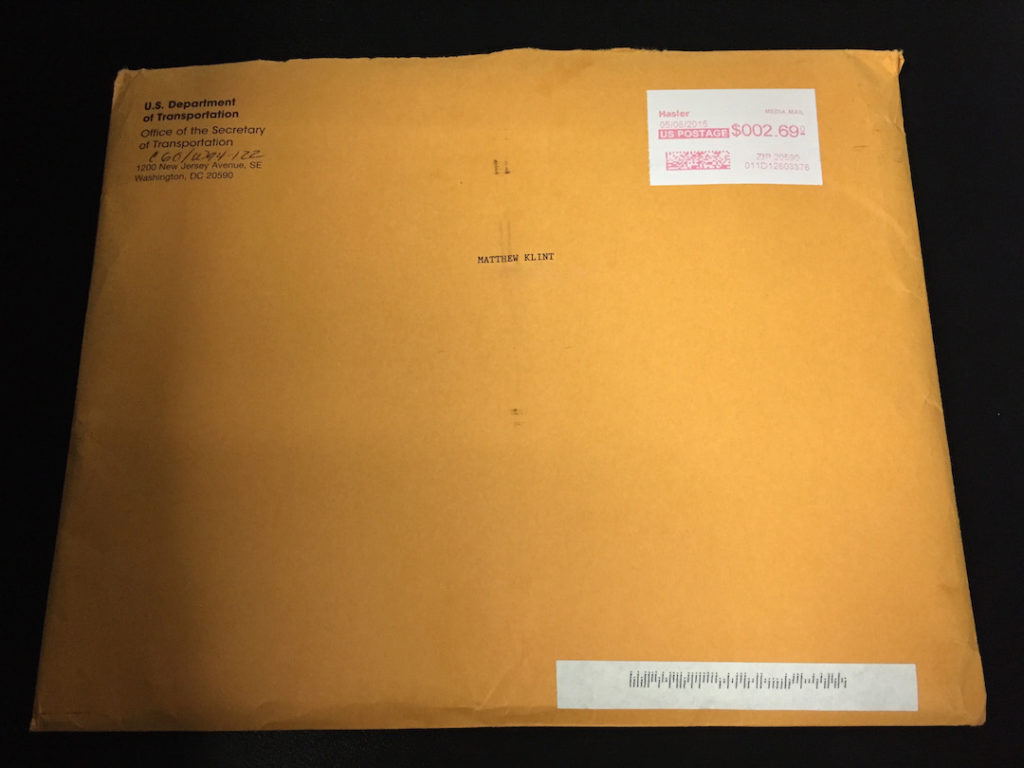
After the United States Department of Transportation (DOT) sided with United Airlines, allowing the carrier to rescind super-cheap first class fares that exploited a pricing glitch on its Danish website, I was curious to see how cozy the relationship was between United and the DOT. How were discussions carried out and how was the agreement reached to allow United to cancel so many ticketed reservations, in a seemingly blatant violation of DOT’s prohibition against post-purchase prices increases? So I did what any civic-minded travel blogger would do: a Freedom of Information Act (FOIA) request to furnish all correspondence between United and DOT concerning this controversy. Yesterday, a package arrived from Washington.
A case officer assigned to my request introduced herself and provided a summary of the enclosed material – about 50 sheets. She also noted a 45-day window to appeal should I not find the information sufficient. It was not sufficient.
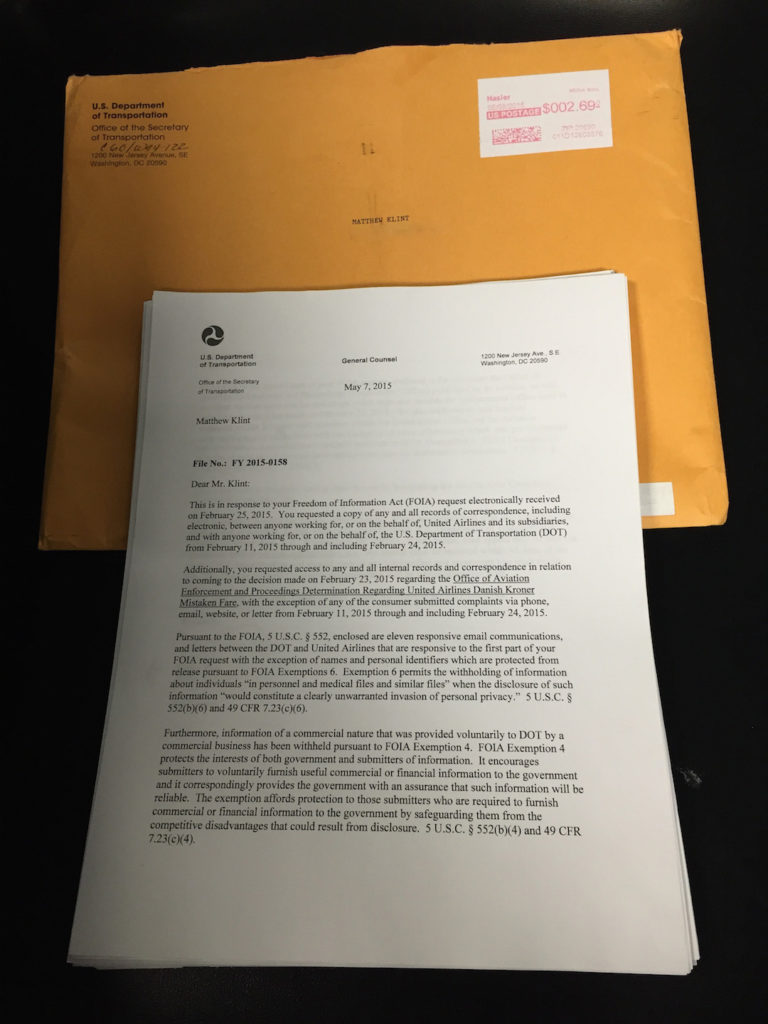
Inside was correspondence between United and the DOT. All names were redacted as expected, but the entirety of United’s legal argument set forward to the DOT was also redacted. E-mail exchanges scheduling joint telephone calls remained, but they were of little value except to show that United jumped on this right away and never questioned that it had to work with the DOT to find resolution to the issue.
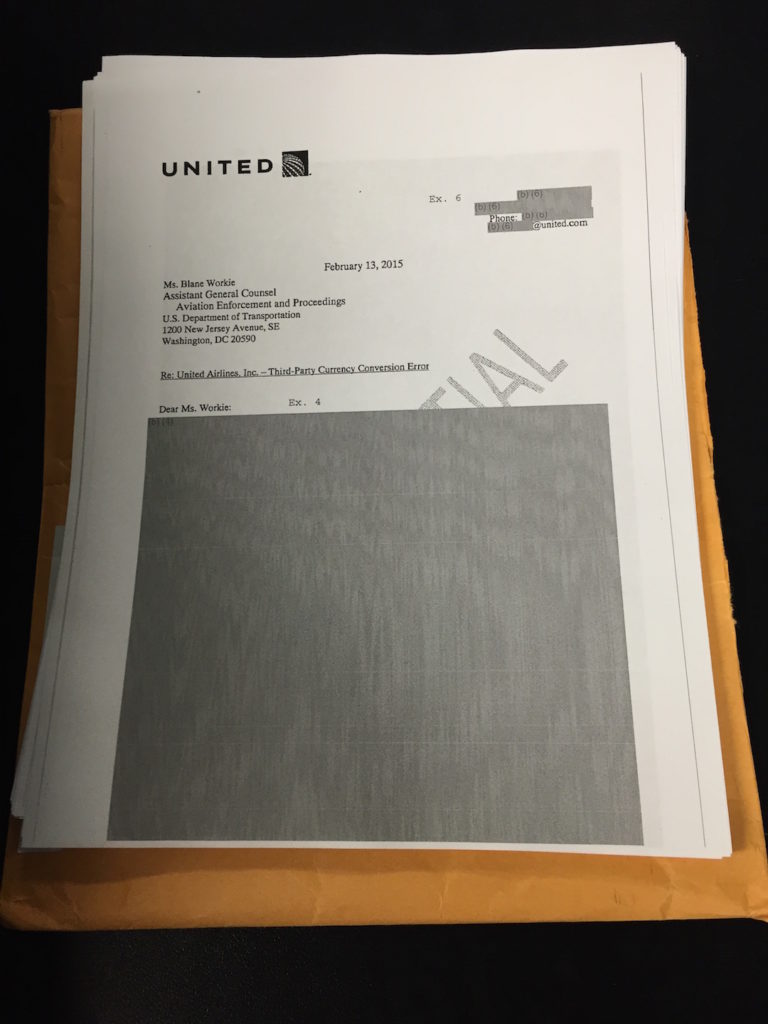
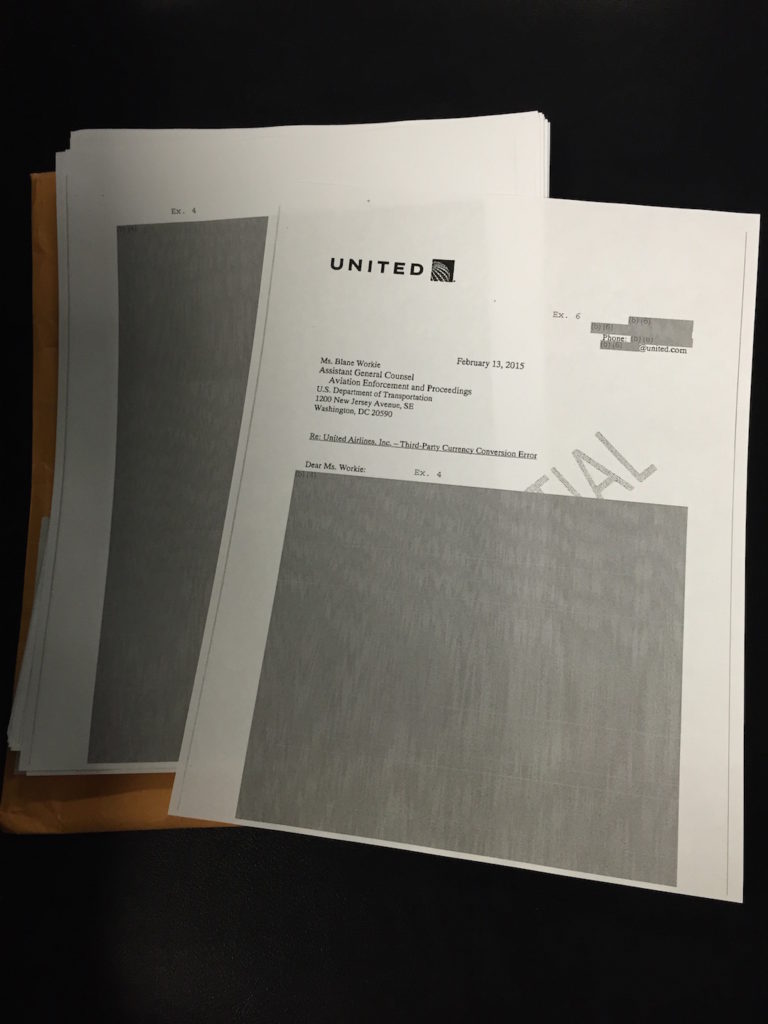
Perhaps the only thing of interest was a timeline United constructed of the event – relying heavily on Flyertalk to construct a narrative in which consumers knew from the outset that this deal required the United website to be manipulated. Frequent Flyertalk posts (including one by me) are included to highlight this and form the evidentiary basis of United’s case to the DOT.
I would love to see the legal rationale that undergirded United’s strong reaction against this particular mistake fare, but I figure an appeal would be a waste of paper: the argument is likely protected work product and beyond the reach of a subpoena.
Nevertheless, we can draw three things from what limited information I received:
- United aggressively used Flyertalk to beat travelers at their own game – providing post after post evidencing the manipulation of United.com and the use of false billing addresses provided credence to its argument that there was no confusion whether this was a sale or mistake.
- United is now on the offensive – A recent Flyertalk thread shared of United creating a Digital Operations Center that will comb the internet for talk of mistake fares in order to more quickly alert United and allow the carrier to take immediate corrective action if/when the next mistake fare is filed. Of note from this story is this internal comment from the 2013 $0 mistake fare — “Flyertalk picked up on it within 30 minutes; however we did not discover it for 50 minutes. After discovery, it took just over 20 minutes to fix this issue; however over the entire duration of 70 minutes we lost $2.9M.”
- This mistake fare was the straw that broke the camel’s back for the DOT’s enforcement of mistake fares – I discussed earlier today the DOT’s new backtrack on protecting consumers from post-purchase price increases and DOT has made clear that consumers exploiting mistake fares on a massive scale – thanks to travel blogs and Flyertalk – forced this change in policy.
I am traveling for the next two days, but when I get home I will scan an upload the full correspondence. No “smoking gun” here, but United’s communication with DOT does show a degree of coziness and a reality that the pendulum is now swinging back in favor of airlines over the question of whether carriers must honor mistake fares.

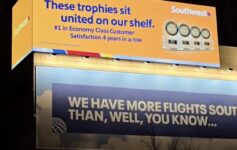


Their argument over money lost is absurd.
By their claim they lost 2.9million dollars over the period of 70 minutes. Within these 70 minutes, I would say its safe to say that the people who took advantage of this exploit were in the small minority.
By their claim they lost: $41k per minute. (2 900 000/70)
Which would mean that in a year their operating expenses would be: 21 billion. (6024365.25*2.9/70)
If they’re referring to “possible sales loss” then they should either have higher expectations on what they sell or they should be taxed on their “expected sales”.
IMO: They’re full of shit and inflating their numbers. Although, I do support the rejection of fares. (The consumer misrepresented themselves)
How can we write a comment to the DOT that both the airline and consumer should have the same 24 hour cooling down period. I don’t want to have a cancelation right before I leave to the airport, there has to be a time period when the airline can cancel the fare.
Matthew,
Is work product a valid denial for disclosure? I used to do confidential treatment requests with the SEC, and legal basis/rationale for non-disclosure was not part of what was confidential more things like commercially sensitive information, proprietary information and information not available elsewhere but not important to understanding of a disclosure.
If you would like to discuss a strategy for securing additional disclosures on this one.
I am now motivated to follow through on getting a FOIA put together on the US3 vs ME3, I want to know what the US3 are passing off to the Feds outside of the public eye.
@Topgunner, I will send you an email. I would like to see United’s legal rationale.
Fascinating! Keep it up!
Of all the comments made on mistake fares from most of the blogs, this is the first FOIA request and analysis I have ever seen. (applaud) Nice work counselor.